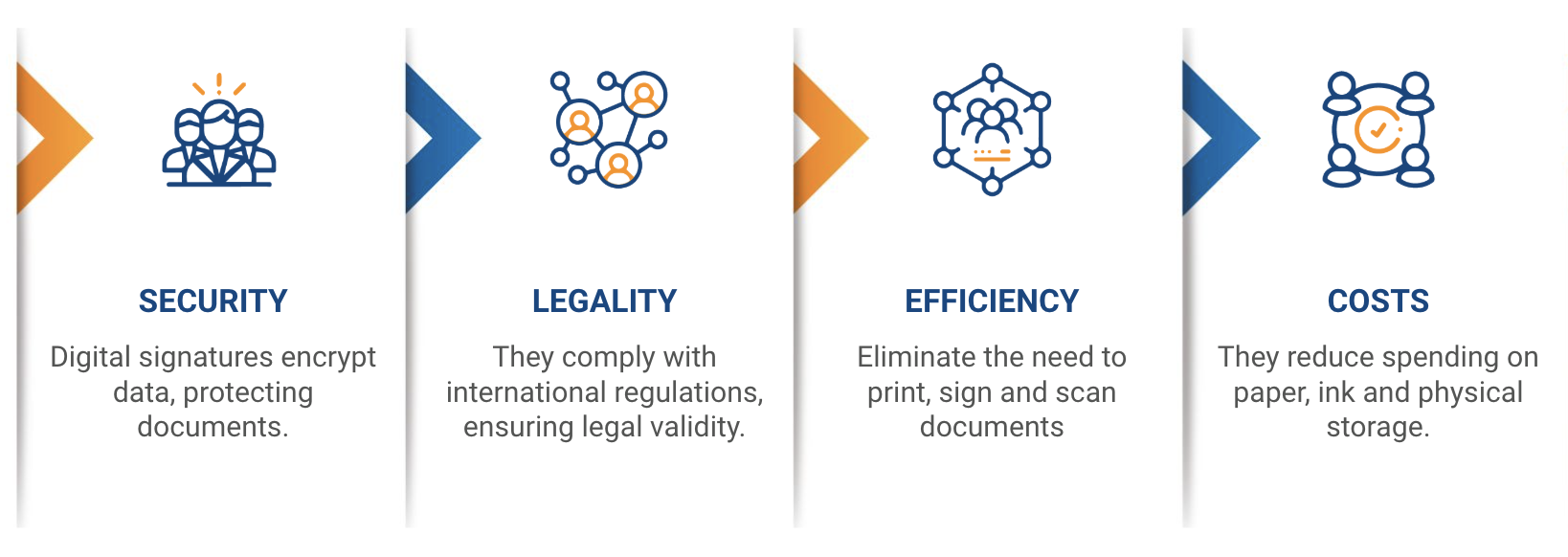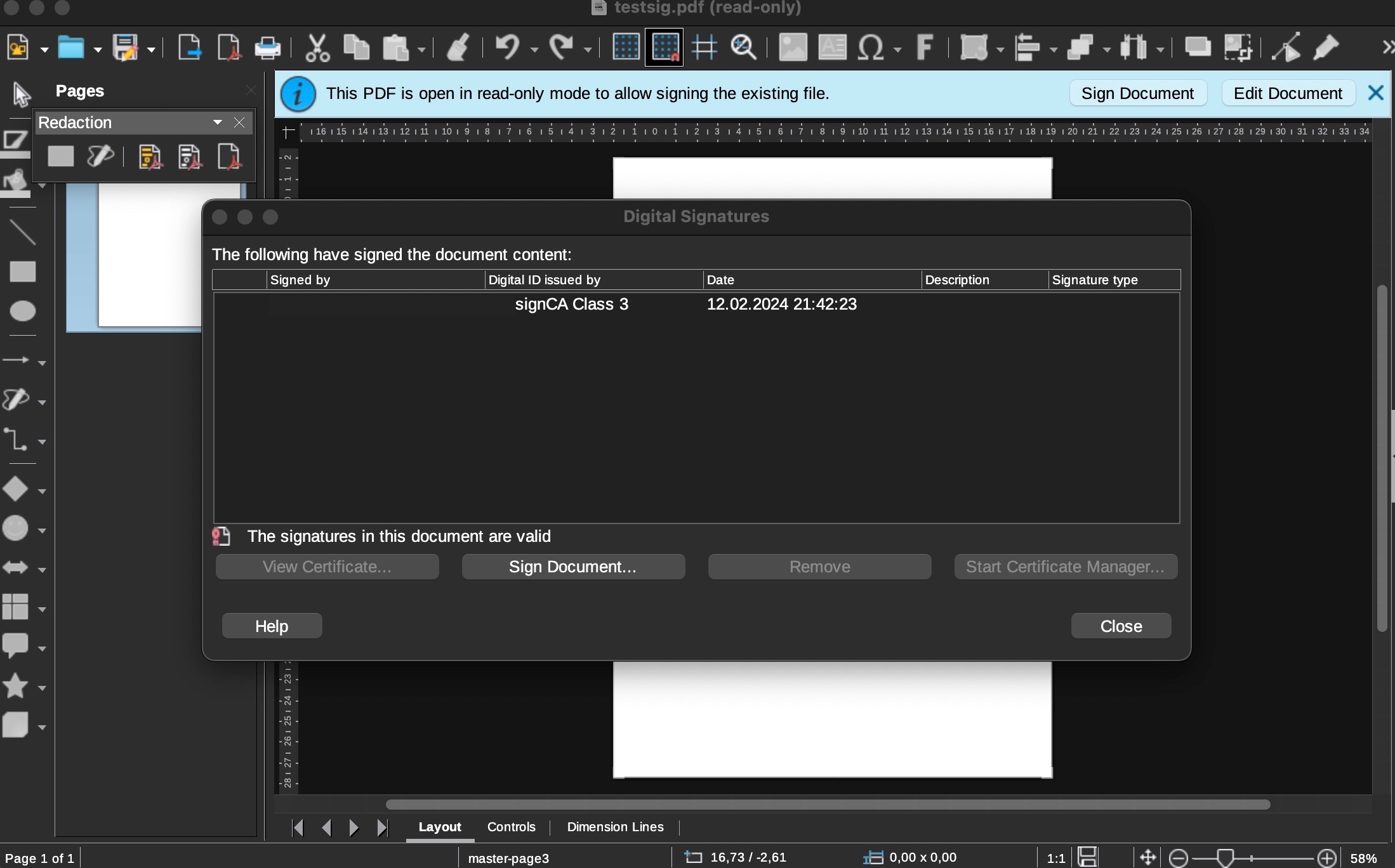Don't struggle anymore to digitally sign a document: We explain how!

In today’s digital world, digital signatures offer an efficient, secure, and legal solution to authenticate electronic documents. Applying them to a PDF document not only streamlines administrative processes but also ensures the integrity and authenticity of the content.
In this blog, we detail the steps to add a digital signature to a PDF document, the advantages of these solutions, and how to choose the best digital signature providers for your business.
What is a digital signature, and how does it work?
A digital signature is a cryptographic method that ensures the authenticity and integrity of a document. When a digital signature is applied to a PDF file:
1. Authentication: The recipient can confirm the signature belongs to the signer.
2. Integrity: It ensures the content has not been altered after signing.
3. Non-repudiation: The signer cannot deny having signed the document.
Digital signature solutions use digital certificates issued by trusted certification authorities (CA), validating the signer’s identity.
Advantages of using digital signature solutions
Before learning how to sign a PDF, it is essential to understand the benefits that digital signatures bring:
Enhanced security: Digital signatures encrypt data, protecting documents from alterations.
Legal compliance: They comply with international regulations such as eIDAS in the European Union or ESIGN in the United States, ensuring legal validity.
Operational efficiency: They eliminate the need to print, sign, and scan documents, streamlining business processes.
Cost reduction: Reduce expenses on paper, ink, and physical storage.

How to add a digital signature to a PDF
There are multiple ways to add a digital signature to a PDF, depending on the software or platform you use. Below are the most common methods:
1. Using Adobe Acrobat
Adobe Acrobat is a popular tool for managing PDF documents and one of the most widely used for applying digital signatures.
Steps
- Open the PDF document in Adobe Acrobat.
- Click on the "Tools" option and select "Certificates."
- Choose "Sign Digitally" and draw an area in the document where you want to add your signature.
- Select a previously installed digital certificate or create a new one.
- Enter your password to validate the signature.
- Save the document with the applied signature.
2. Using cloud-based digital signature solutions
Tools like DocuSign, SignNow, or HelloSign allow you to sign PDF documents without additional software. These platforms are ideal for businesses managing large volumes of documents.
Steps
- Upload your PDF to the digital signature provider of your choice.
- Define the fields where the signature is required.
- Apply your signature using a digital certificate or verified electronic identity.
- Download the signed document or send it directly to the recipient.
3. Using free tools or built-in operating system features
Some operating systems, like Windows and macOS, offer basic functionalities for electronically signing PDFs. However, these options often lack the robustness of dedicated digital signature solutions.
On macOS Preview
- Open the PDF in Preview.
- Select "Tools" > "Annotate" > "Signature."
- Sign using the trackpad or upload a scanned signature.
On Windows
- Use Microsoft Edge to open the PDF.
- Activate annotation mode to draw your signature.
While these solutions are convenient, they do not include the authentication and encryption levels offered by specialized platforms.

Factors to consider when choosing a digital signature provider
Selecting a suitable provider is key to ensuring security and regulatory compliance. Here are some aspects to consider:
Compatibility
Verify that the solution works with the document formats and operating systems you use.
Legal compliance
Ensure the provider complies with relevant regulations in your region.
Ease of use
Look for an intuitive interface and tools that simplify the signing process.
Integrations
The provider should offer integration with business software like CRM, ERP, or document management tools.
Cost
Compare prices of different solutions and evaluate their value for money based on your needs.
Technical support
Ensure reliable support is available to quickly resolve issues.
Top digital signature providers
Some of the leading providers include:
DocuSign: Ideal for businesses seeking a robust and widely accepted solution.
Adobe Sign: Offers seamless integration with Adobe products and compliance with international regulations.
HelloSign: A simple and affordable solution for small and medium businesses.
SignNow: Known for its ease of use and advanced features like reusable templates.
Best practices for implementing digital signatures
To maximize the benefits of digital signatures, follow these recommendations:
Educate your team: Ensure everyone understands how to use digital signature tools.
Protect your certificates: Store digital certificates in a secure environment to prevent unauthorized access.
Keep tools updated: Maintain up-to-date digital signature software for compatibility and security.
Evaluate your workflow: Identify processes that can benefit most from digitalization through electronic signatures.
Implementing digital signatures in your PDF documents is a smart strategy to optimize processes, enhance security, and comply with legal regulations. Whether using tools like Adobe Acrobat or cloud-based solutions from leading providers, the available options are varied and adaptable to any company’s needs.
Investing in one of the many digital signature solutions on the market not only modernizes your business but also strengthens trust with customers and partners. Assess your needs, select the right provider, and take your workflows to the next level.


